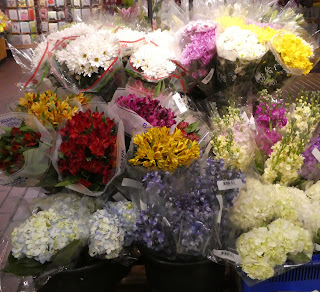FEELING HYDRANGEA-STARVED?
Feeling hydrangea-starved? That describes me a week or two ago. Then we had two consecutive days of temps in the 60s. That gave me a terminal case of spring fever! But I knew enough not to rush out and start playing with my hydrangeas. Living in zone 5, there’s a lot of winter still ahead of me. February is right around the corner and then there are the cruel 31 days of March. So what’s a hydrangea-lover to do?
Fortunately, there are cut flowers for sale just about everywhere. My local florist, grocery store, box stores like Costco and BJs are just a few options.
 |
| Cut flowers for sale in retail stores. |
Look what happened – they all drooped within a few hours of being in my kitchen.
 |
| Hydrangeas starting to wilt after being put in a vase. |
First, the science. Hydrangeas produce a sap in their stems much like a pine tree. That sap clogs the stem and prevents water uptake. That’s why they wilt: no water is getting to the flower. So all I had to do was get rid of that sap and prevent it from returning.
There are a few ways to attack and neutralize that sap. In all cases, you need to get your flowers in lukewarm water immediately after being cut. So bring a vase or bucket of warm water with you when you go out to the garden to cut some blooms. Second, make sure you use very sharp pruners or scissors to avoid prematurely crushing the stem when you make your diagonal cut. Then you have a choice of several options.
·
One is to
crush the stem end with a hammer to open it up. This seems unnecessarily
violent to me and I’m not fond of bruising my flowers so I opted against that
one.
·
The second is
to put the cut end of the stem in boiling water for a few minutes to break up
the sap. If you have the time, it works.
·
The next one
is to dip your cut stems in alum powder, a compound available in your grocery
store spice aisle.
It’s mildly acidic and retards the growth of algae. Its best feature is it makes the vase water slightly more acidic which moves more readily through the stems of cut flowers than tap water which is usually neutral.
 |
| Alum powder helps keep cut flowers fresh in the vase. |
It’s mildly acidic and retards the growth of algae. Its best feature is it makes the vase water slightly more acidic which moves more readily through the stems of cut flowers than tap water which is usually neutral.
·
And last, you
can dip your cut ends in Floralife® Quick Dip Hydrating Treatment Solution.
It’s an acidic product that breaks up the sap and allows the stems to take up the water. You can find it online and in craft stores. |
| Flower preservative for use with cut flowers. |
I was working quickly as I didn’t have time to boil water, or go out to get the alum. As it happens, I had some Floralife® Quick Dip on hand from when I cut some dahlias last summer. That made my decision easy.
After I recut and dipped the stems, I removed several leaves to direct as much water to the flowers as possible. They are heavy drinkers and I wanted all the water to go to the flowers.
I’m delighted to report the flowers miraculously came back to life.
 |
| Hydrangeas rehydrated after using Floralife® Quick Dip |
With this new skill, I won’t mind spending the money for my cut flowers knowing I can keep them looking fresh for more than a week. That’s less than $1/day and what I would pay for a couple of coffees.
Pretty good deal, if you ask me!



